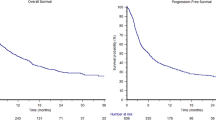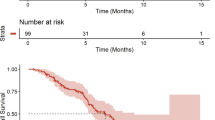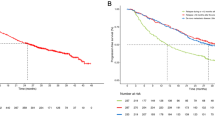Abstract
Background
Cancer of unknown primary (CUP) lacks established therapy although it affects 3% of cancer patients. We evaluated the irinotecan–oxaliplatin combination (IROX regimen) in previously untreated patients with non-favorable subsets of unknown primary carcinomas.
Methods
This was a multicenter phase-II trial. Protocol treatment consisted of oxaliplatin 80 mg/m2 followed by irinotecan 160 mg/m2 administered every 3 weeks. The primary end points were response rate and toxicity, and secondary end points were time to progression and survival.
Results
Forty-seven patients with liver, bone or multiple visceral metastases entered into the trial and received a median 6 chemotherapy cycles (1–11). The regimen was very well tolerated with one febrile neutropenia case and six cases with diarrhea grade 3 (16%). In intent-to-treat analysis the tumor response rate was 13% (95% CI = 4.8–25.7%) and 12 patients (27%, 95%CI 13.9–40.4%) had at least 4 months’ duration of disease stabilization. The median time to progression was 2.7 months and the median survival was 9.5 months, with 40% of patients alive at 1 year.
Conclusions
The IROX regimen demonstrated similar efficacy and a favorable toxicity profile compared to other more toxic chemotherapy combinations in patients with poor-prognosis CUP.

Similar content being viewed by others
References
Briasoulis E, Pavlidis N (1997) Cancer of unknown primary origin. Oncologist 2:142–152
Muir C (1995) Cancer of unknown primary site. Cancer 75:353–356
Pavlidis N, Briasoulis E, Hainsworth J, Greco FA (2003) Diagnostic and therapeutic management of cancer of an unknown primary. Eur J Cancer 39:1990–2005
Ayoub JP, Hess KR, Abbruzzese MC, Lenzi R, Raber MN, Abbruzzese JL (1998) Unknown primary tumors metastatic to liver. J Clin Oncol 16:2105–2112
Briasoulis E, Kalofonos H, Bafaloukos D, et al (2000) Carboplatin plus paclitaxel in unknown primary carcinoma: a phase II Hellenic cooperative oncology group study. J Clin Oncol 18:3101–3107
Pentheroudakis G, Briasoulis E, Karavassilis V, et al (2005) Chemotherapy for patients with two favourable subsets of unknown primary carcinoma: active, but how effective? Acta Oncol 44:155–160
Armstrong AC, Blackhall FH (2007) Management of cancer from an unknown primary. Expert Opin Pharmacother 8:445–455
Briasoulis E, Tsavaris N, Fountzilas G, et al (1998) Combination regimen with carboplatin, epirubicin and etoposide in metastatic carcinomas of unknown primary site: a Hellenic co-operative oncology group phase II study. Oncology 55:426–430
Strnad CM, Grosh WW, Baxter J, et al (1989) Peritoneal carcinomatosis of unknown primary site in women. A distinctive subset of adenocarcinoma. Ann Intern Med 111:213–217
Hainsworth JD, Greco FA (1993) Treatment of patients with cancer of an unknown primary site. N Engl J Med 329:257–263
Yakushiji S, Ando M, Yonemori K, et al (2006) Cancer of unknown primary site: review of consecutive cases at the national cancer center hospital of Japan. Int J Clin Oncol 11:421–425
Kawato Y, Furuta T, Aonuma M, Yasuoka M, Yokokura T, Matsumoto K (1991) Antitumor activity of a camptothecin derivative, CPT-11, against human tumor xenografts in nude mice. Cancer Chemother Pharmacol 28:192–198
Vaisman A, Varchenko M, Umar A, et al (1998) The role of hMLH1, hMSH3, and hMSH6 defects in cisplatin and oxaliplatin resistance: correlation with replicative bypass of platinum-DNA adducts. Cancer Res 58:3579–3585
Judson I, Kelland LR (2000) New developments and approaches in the platinum arena. Drugs 59(Suppl 4):29–36
Zeghari-Squalli N, Raymond E, Cvitkovic E, Goldwasser F (1999) Cellular pharmacology of the combination of the DNA topoisomerase I inhibitor SN-38 and the diaminocyclohexane platinum derivative oxaliplatin. Clin Cancer Res 5:1189–1196
Tanaka R, Ariyama H, Qin B, et al (2005) Synergistic interaction between oxaliplatin and SN-38 in human gastric cancer cell lines in vitro. Oncol Rep 14:683–688
Monnet I, Brienza S, Hugret F, et al (1998) Phase II study of oxaliplatin in poor-prognosis non-small cell lung cancer (NSCLC). ATTIT. Association pour le traitement des tumeurs intra thoraciques. Eur J Cancer 34:1124–1127
Conroy T, Paillot B, Francois E, et al (2005) Irinotecan plus oxaliplatin and leucovorin-modulated fluorouracil in advanced pancreatic cancer—a groupe tumeurs digestives of the Federation nationale des centres de lutte contre le cancer study. J Clin Oncol 23:1228–1236
Hoff PM, Wolff RA, Xiong H, et al (2006) Phase II trial of combined irinotecan and oxaliplatin given every 3 weeks to patients with metastatic colorectal cancer. Cancer 106:2241–2246
Bidoli P, Zilembo N, Cortinovis D, et al (2007) Randomized phase II three-arm trial with three platinum-based doublets in metastatic non-small-cell lung cancer. An Italian trials in medical oncology study. Ann Oncol 18:461–467
Wasserman E, Cuvier C, Lokiec F, et al (1999) Combination of oxaliplatin plus irinotecan in patients with gastrointestinal tumors: results of two independent phase I studies with pharmacokinetics. J Clin Oncol 17:1751–1759
Therasse P, Arbuck SG, Eisenhauer EA, et al (2000) New guidelines to evaluate the response to treatment in solid tumors. European organization for research and treatment of cancer, national cancer institute of the United States, national cancer institute of Canada. J Natl Cancer Inst 92:205–216
Briasoulis E, Pavlidis N (2007) Cancers of unknown primary site: ESMO clinical recommendations for diagnosis, treatment and follow-up. Ann Oncol 18(Suppl 2):ii81–ii82
van de Wouw AJ, Janssen-Heijnen ML, Coebergh JW, Hillen HF (2002) Epidemiology of unknown primary tumours; incidence and population-based survival of 1285 patients in Southeast Netherlands, 1984–1992. Eur J Cancer 38:409–413
Levi F, Te VC, Erler G, Randimbison L, La Vecchia C (2002) Epidemiology of unknown primary tumours. Eur J Cancer 38:1810–1812
Pavlidis N (2007) Forty years experience of treating cancer of unknown primary. Acta Oncol 46:592–601
Parnis FX, Olver IN, Kotasek D, et al (2000) Phase II study of epirubicin, cisplatin and continuous infusion 5-fluorouracil (ECF) for carcinoma of unknown primary site. Ann Oncol 11:883–884
Dowell JE, Garrett AM, Shyr Y, Johnson DH, Hande KR (2001) A randomized phase II trial in patients with carcinoma of an unknown primary site. Cancer 91:592–597
Greco FA, Burris HA III, Litchy S, et al (2002) Gemcitabine, carboplatin, and paclitaxel for patients with carcinoma of unknown primary site: a Minnie pearl cancer research Network study. J Clin Oncol 20:1651–1656
Culine S, Fabbro M, Ychou M, Romieu G, Cupissol D, Pinguet F (2002) Alternative bimonthly cycles of doxorubicin, cyclophosphamide, and etoposide, cisplatin with hematopoietic growth factor support in patients with carcinoma of unknown primary site. Cancer 94:840–846
Pittman KB, Olver IN, Koczwara B, et al (2006) Gemcitabine and carboplatin in carcinoma of unknown primary site: a phase 2 Adelaide cancer trials and education collaborative study. Br J Cancer 95:1309–1313
Berry W, Elkordy M, O’rourke M, Khan M, Asmar L (2007) Results of a phase II study of weekly paclitaxel plus carboplatin in advanced carcinoma of unknown primary origin: a reasonable regimen for the community-based clinic? Cancer Invest 25:27–31
Pentheroudakis G, Briasoulis E, Pavlidis N (2007) Cancer of unknown primary site: missing primary or missing biology? Oncologist 12:418–425
Hainsworth JD, Erland JB, Kalman LA, Schreeder MT, Greco FA (1997) Carcinoma of unknown primary site: treatment with 1-hour paclitaxel, carboplatin, and extended-schedule etoposide. J Clin Oncol 15:2385–2393
Karavasilis V, Malamou-Mitsi V, Briasoulis E, et al (2005) Angiogenesis in cancer of unknown primary: clinicopathological study of CD34, VEGF and TSP-1. BMC Cancer 5:25
Hainsworth JD, Spigel DR, Farley C, Thompson DS, Shipley DL, Greco FA (2007) Phase II trial of bevacizumab and erlotinib in carcinomas of unknown primary site: the Minnie pearl cancer research Network. J Clin Oncol 25:1747–1752
Pentheroudakis G, Pavlidis N (2006) Perspectives for targeted therapies in cancer of unknown primary site. Cancer Treat Rev 32:637–644
Hurwitz H, Fehrenbacher L, Novotny W, et al (2004) Bevacizumab plus irinotecan, fluorouracil, and leucovorin for metastatic colorectal cancer. N Engl J Med 350:2335–2342
Sandler A, Gray R, Perry MC, et al (2006) Paclitaxel-carboplatin alone or with bevacizumab for non-small-cell lung cancer. N Engl J Med 355:2542–2550
Acknowledgments
The authors wish to thank Georgia Vourli for excellent job in statistical analysis of this study.
Author information
Authors and Affiliations
Corresponding author
Rights and permissions
About this article
Cite this article
Briasoulis, E., Fountzilas, G., Bamias, A. et al. Multicenter phase-II trial of irinotecan plus oxaliplatin [IROX regimen] in patients with poor-prognosis cancer of unknown primary: a hellenic cooperative oncology group study. Cancer Chemother Pharmacol 62, 277–284 (2008). https://doi.org/10.1007/s00280-007-0604-7
Received:
Accepted:
Published:
Issue Date:
DOI: https://doi.org/10.1007/s00280-007-0604-7




